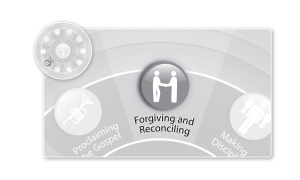 Post by Pastor Tim – When I was twelve years old, I remember breaking a lamp while playing basketball in my parents’ house. My mom forgave me, but she didn’t forget. In fact, my mom and I still joke about this, some 24 years after the incident. I’ve had a similar experience with my almost-twelve year old son. He spilled grape juice and almost ruined our carpet. Just my recounting of the story should be evidence that I haven’t forgotten either.
Post by Pastor Tim – When I was twelve years old, I remember breaking a lamp while playing basketball in my parents’ house. My mom forgave me, but she didn’t forget. In fact, my mom and I still joke about this, some 24 years after the incident. I’ve had a similar experience with my almost-twelve year old son. He spilled grape juice and almost ruined our carpet. Just my recounting of the story should be evidence that I haven’t forgotten either.
The fact that I haven’t forgotten isn’t incidental to the story, and it’s not a regrettable by-product either. “Not forgetting” is actually an important part of forgiveness that Christians often get all wrong.
Christians unfortunately translate Scriptures such as Jeremiah 31:34, Hebrews 8:12, or Hebrews 10:17 as meaning that God is woefully indulgent. We make God out to be a lenient grandfather type or cool friend who only remembers the good in us. But when the Bible says that “God remembers our sin no more,” it doesn’t mean that He has avoidance issues; rather it means that He has dealt with our sins conclusively on the cross of Christ. Through the finished work of Jesus Christ, our sins are not only no longer held against us; even more, they are used by God as he helps us grow and as we come to understand his character better.
The Scriptures are full of examples of “not forgetting,” including the entire Old Testament. The Old Testament is a record of God’s dealings with the nation of Israel, and a lot of that “record” has to do with the sin of God’s followers!
Paul makes this clear in 1 Timothy 1:15, when he claims brings that he is the worst of all sinners. Paul wasn’t speaking in platitudes but rather was remembering that he was once a persecutor of Christians and of Christ himself. Paul remembered (and God did, too), so that “Christ Jesus might display his unlimited patience as an example for those who would believe on him and receive eternal life.”
My example of spilled grape juice hardly compares to Paul’s, but the principle is still the same. By how I remember the grape juice spill–neither overlooking it nor harping on it but instead growing him (and our relationship) on through it and even with it–my son has a constant reminder of the forgiveness and patience of a loving father. This also serves as an example of forgiveness and patience to my daughters and any of their friends that visit. In other words, my son’s remembering how I dealt with the spilled grape juice is a testimony not only to him but to his circle of influence as well.
Sin always has consequences and the need for divine healing and reconciliation is always present. The “not forgetting” part of forgiveness enables those things to be dealt with openly and graciously. God is never interested in forgetting because his plan always involves healing, restoration and sanctification.
Even though I gave forgiveness rather quickly to my son, there were still consequences and actions he experienced as a result of the grape juice. He had to help clean up the mess, and he was instructed with ways to be more careful the next time. He will also be held accountable for his carelessness in the future.
The discerning reader might say, “Aha! But sin is intentional transgression of God’s will! Spilled grape juice is but an accident and thus an easy occasion for grace.” But anyone who has young children knows that spilled grape juice is typically tied to a willful carelessness that flies in the face of multiple parental warnings. It is rarely a victimless crime!
And similar to God, I also “remember no more,” in that when I look at my son, I don’t see him as the “boy who ruined both our carpet and our relationship because he spilled his grape juice all over.” I see him as a wonderful boy who is growing up to be a man of God. I see him in light of the forgiveness that I gave. He still has plenty of “growing up” to do, but that is the reason why I am his dad . . . to help him grow.
And this is why when God forgives you, He doesn’t forget. It’s not that He plans on bringing up all your failures at a moment each time you fall. It’s because it is vitally important, not only to your spiritual growth, but to the spiritual growth of others that you have contact with, that you have a testimony of how he forgave you each time he lifted you to your feet again.











I, too, am proud of Pastor Tim’s God-given incredibly practical and earthy brand of theology.